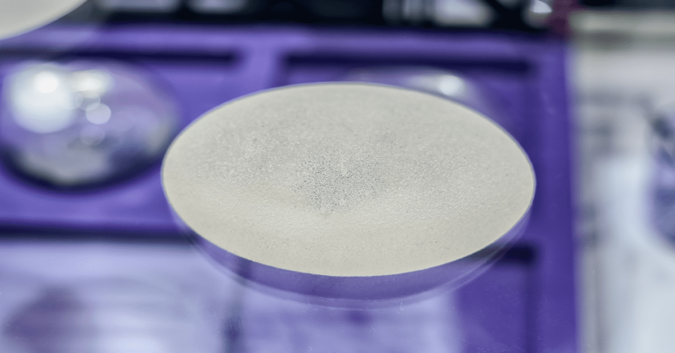The Food and Drug Administration (FDA) has requested that Allergan recall specific BIOCELL textured breast implants from the global market. The agency said that the move will protect women from an increased risk of developing a rare form of cancer known as breast implant-associated anaplastic large cell lymphoma (BIA-ALCL).
In a press announcement on July 24, the FDA said that the “continued distribution of Allergan’s BIOCELL textured breast implants would likely cause serious, adverse health consequences and potentially death from BIA-ALCL.”
The rare but treatable disease is a type of non-Hodgkin’s lymphoma — an immune system cancer rather than a breast cancer. Typically, BIA-ALCL is discovered in the fluid and scar tissue around the implant. If found early, the prognosis is usually good. Symptoms of BIA-ALCL include swelling or pain near the breast implant that begin after the surgical incision has healed.
According to the new analysis from the FDA:
“The risk of BIA-ALCL with Allergan BIOCELL textured implants is approximately 6 times the risk of BIA-ALCL with textured implants from other manufacturers.”
Doctors have been advised to stop using the devices and make arrangements to return unused inventory to Allergan, the Dublin-based pharmaceutical company, which has agreed to move forward with the recall.
For women who have had a recalled device implanted, the FDA does not recommend removing the implant. If they are presenting symptoms of BIA-ALCL, they should speak immediately with their doctor.
Which Allergan Breast Implant Devices Were Recalled?
So far, 4 types of breast implants and 2 types of tissue expanders have been recalled.
- Natrelle Saline-Filled breast implants
- Natrelle Silicone-Filled breast implants
- Natrelle Inspira Silicone-Filled breast implants
- Natrelle 410 Highly Cohesive Anatomically Shaped Silicone-Filled breast implants
- Natrelle 133 Plus Tissue Expander
- Natrelle 133 Tissue Expander with Suture Tabs
Tissue expanders are used in preparation of breast implant or flap reconstruction. They gradually stretch the muscle and skin in the breast area. When it comes time for the operation, the expander is removed, and there is sufficient space for the permanent implant.
The full list of all products and styles of recalled BIOCELL devices is included in a safety communication released by the FDA in conjunction with the recall.
Why Did the FDA Initiate a Recall Now?
The recall is a significant step and a change in direction for the FDA, who declined to recall breast implants in May. At that time, the agency raised awareness about the risks of breast implant-associated cancer, and asked providers and patients to report diagnoses, treatments, and confirmed pathologies related to BIA-ALCL.
After gathering more evidence, the FDA reported a new worldwide total of 573 unique cases of BIA-ALCL. In 481 of those cases, patients had Allergan breast implant at the time of diagnosis. They also reported 33 patient deaths, which include 24 additional cases since the agency’s last update in February.
Of the 13 deaths where the manufacturer has been identified, 12 involve an Allergen breast implant. FDA Principal Deputy Commissioner Amy Abernethy said:
“Although the overall incidence of BIA-ALCL appears to be relatively low, once the evidence indicated that a specific manufacturer’s product appeared to be directly linked to significant patient harm, including death, the FDA took action to alert the firm to new evidence indicating a recall is warranted to protect women’s health.”
Because of the cancer risks, Allergan’s breast implants have already been recalled in 38 countries. In the United States, roughly 5% of women use textured implants, which is much lower than in many other countries.
Are Other Types of Textured Breast Implants Safe?
Two other manufacturers, Mentor and Sientra, market textured breast implants in America, but at this time, the FDA has not linked them to BIA-ALCL. Even so, women should be aware that there is a risk of developing cancer as a result of breast implants, and that the risk is higher with textured implants compared to smooth-surfaced ones.
Jeff Shuren, director of the FDA’s Center for Devices and Radiological Health, promised that the agency will continue to, “evaluate any new information and may, as a result, take action regarding other breast implants, if warranted. In addition, we are continuing our assessment to determine whether the risk of developing BIA-ALCL is limited to specific models of textured, or all textured breast implants.”
All of the currently recalled breast implant devices have the same BIOCELL textured surface, which is unique to Allergan products. The textured surface is hypothesized to play a role in the development of BIA-ALCL, which may result from a prolonged immune system response in the capsule — the scar tissue and fluid that form around the implant inside the breast.
“We will continue to monitor the incidence of BIA-ALCL across other textured and smooth breast implants and tissue expanders as well as other devices intended for use in the breast,” said Abernathy. “If action is needed in the future, we will not hesitate to do what is necessary to protect patients.”
Women who chose to put textured implants inside their body were never warned about the small but serious risk of developing BIA-ALCL. Although the outlook for women who discover breast implant cancer early is promising, it may require several surgeries as well as chemotherapy and radiotherapy.
Please contact us if you are interested in learning more about your legal rights for a Allergan breast implant lawsuit, and we will walk you through your options.
All brands are trademarks of their respective companies.
